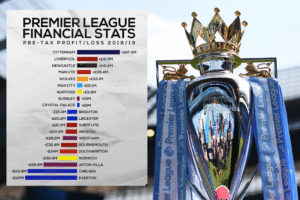Premier League’s Financial Impact on Clubs

The English Premier League (EPL) stands as a global titan in sports economics, with its financial influence reverberating across the footballing world. Its revenue streams—spanning broadcasting rights, sponsorships, matchday earnings, and commercial ventures—have not only transformed the league into a multi-billion-pound enterprise but have also reshaped the financial landscapes of its constituent clubs. This article delves into the multifaceted financial impact of the Premier League on its clubs, examining how these financial dynamics influence club operations, competitive balance, and the broader football ecosystem.
1. Revenue Streams: The Pillars of Premier League Wealth
1.1 Broadcasting Rights: The Cornerstone of Income
Broadcasting rights constitute the largest revenue stream for Premier League clubs. In the 2023/24 season, the league’s broadcasting revenue remained robust at €4.3 billion, with expectations of growth in the 2025/26 cycle due to new media rights deals in the Middle East and Asia-Pacific regions. This influx of funds is distributed among clubs based on a combination of factors, including league position, match appearances, and historical performance, ensuring a competitive balance while rewarding success.Football Unspoken
1.2 Sponsorships: Commercial Partnerships Fueling Growth
Sponsorship deals have become increasingly lucrative, with the Premier League’s total sponsorship revenue reaching $1.68 billion for the 2024/25 season. Clubs like Manchester City and Arsenal have capitalized on their global appeal to secure high-value partnerships, significantly boosting their commercial income. These partnerships extend beyond traditional sponsorships to include kit deals, regional collaborations, and digital content agreements, reflecting the league’s expansive commercial reach.GlobalDataFootball Unspoken
1.3 Matchday Revenue: The Impact of Stadium Experience
Matchday income remains a vital revenue source, particularly for clubs with large, modern stadiums. For instance, Manchester City’s expanded Etihad Stadium and Tottenham Hotspur’s state-of-the-art arena have enhanced their matchday revenues through increased ticket sales and premium hospitality offerings. In the 2023/24 season, Arsenal’s matchday income surged to €121 million, the highest in England, underscoring the financial significance of a compelling matchday experience. Football Unspoken
1.4 Commercial Ventures: Diversifying Income Streams
Clubs are increasingly diversifying their income through various commercial ventures. Arsenal’s retail partnerships, for example, contributed to a 62% increase in commercial revenue, reaching €294 million. Similarly, Newcastle United’s commercial deals have tripled, reflecting the growing importance of non-matchday revenue streams in sustaining financial health. Football Unspoken
2. Financial Disparities: The Divide Between the Elite and the Rest
While the Premier League’s financial model promotes competitiveness, it also accentuates disparities among clubs. The ‘Big Six’—Manchester City, Manchester United, Arsenal, Liverpool, Chelsea, and Tottenham Hotspur—dominate revenue generation, collectively accounting for a significant portion of the league’s total income. This concentration of wealth enables these clubs to invest heavily in player acquisitions, wages, and infrastructure, thereby perpetuating their competitive advantage.
Clubs outside this elite group often face challenges in competing financially, leading to a cycle where financial power translates into on-field success, which in turn attracts more revenue. This dynamic raises questions about the sustainability of competitive balance within the league and the long-term implications for clubs striving to break into the upper echelons.
3. Financial Fair Play and Governance: Ensuring Sustainability
To address financial disparities and promote sustainability, the Premier League enforces Financial Fair Play (FFP) regulations. These rules are designed to prevent clubs from spending beyond their means and accumulating unsustainable debt. However, the enforcement of FFP has been contentious. In 2023, Everton FC was deducted 10 points for breaching FFP rules by reporting a £371.8 million loss over three years, exceeding the permissible limit of £105 million. This unprecedented sanction highlighted the league’s commitment to maintaining financial discipline but also underscored the challenges in balancing enforcement with the clubs’ financial ambitions.Wikipedia
The introduction of an independent football regulator, David Kogan, has further emphasized the need for financial oversight. Kogan has urged the Premier League and the English Football League (EFL) to finalize a financial redistribution deal to address existing financial disparities and ensure the sustainability of the football pyramid. The Guardian+1thetimes.co.uk+1
4. Economic and Social Impact: Beyond the Balance Sheet
The financial influence of the Premier League extends beyond the confines of club accounts, significantly impacting local economies and communities. Arsenal FC’s Economic and Social Impact Report revealed that the club contributed over £616 million to the UK economy during the 2022/23 season, supporting more than 4,400 jobs and reaching over 14,000 individuals through community initiatives. Such contributions underscore the league’s role as a catalyst for economic development and social cohesion.
Furthermore, the Premier League’s investment in grassroots football and facility upgrades has bolstered the infrastructure of the sport at all levels. Through the Premier League Stadium Fund, the league has provided grants totaling nearly £200 million since 2000, enhancing facilities for over 1,000 clubs across England and Wales. These initiatives ensure that the benefits of the league’s financial success permeate throughout the footballing community.
5. Challenges and Future Outlook
Despite its financial prowess, the Premier League faces several challenges that could impact its future trajectory. The concentration of wealth among a few elite clubs poses risks to competitive balance, potentially diminishing the league’s appeal to fans and broadcasters. Additionally, the global expansion of football, including the staging of matches abroad, may strain traditional fan bases and alter the dynamics of domestic competitions.









Post Comment